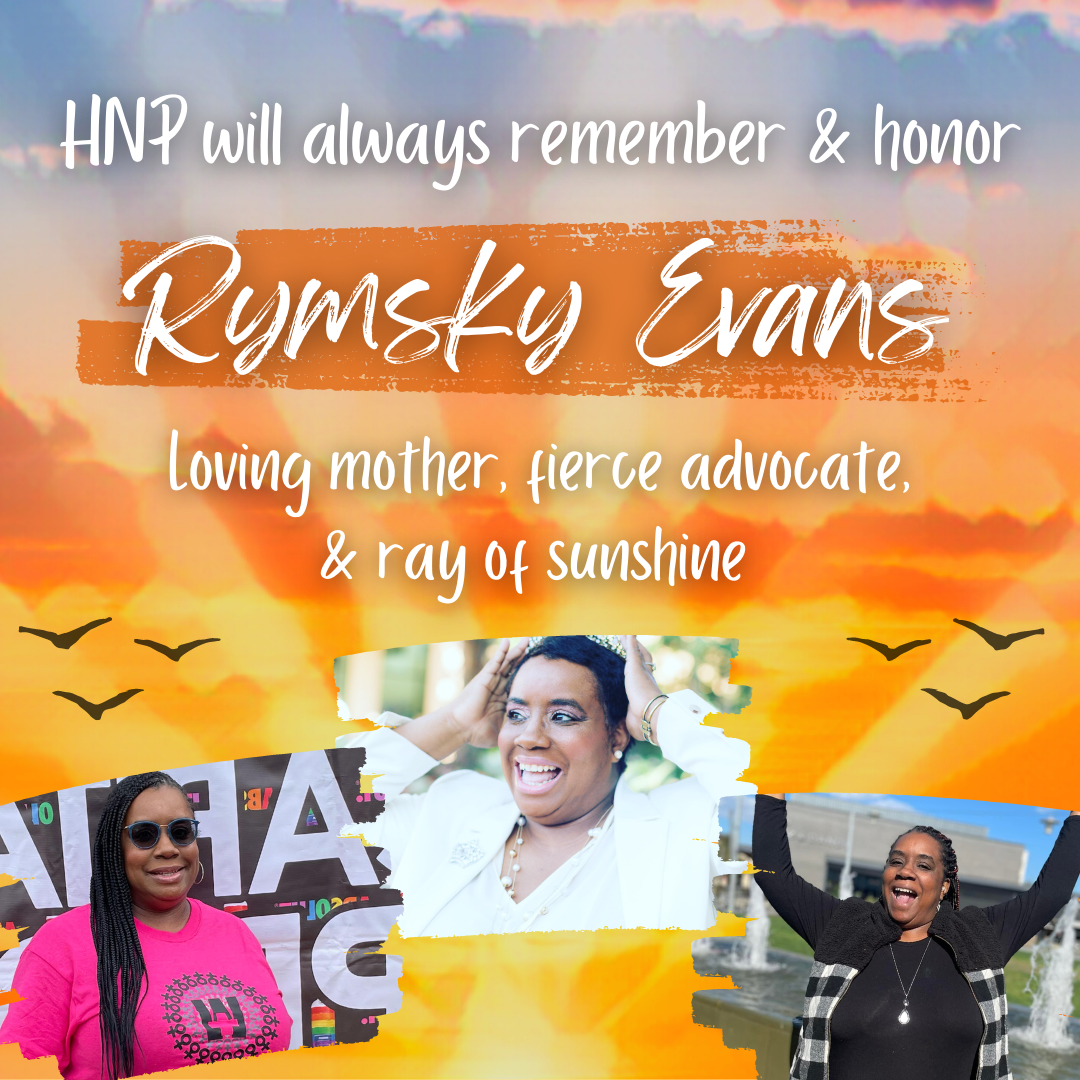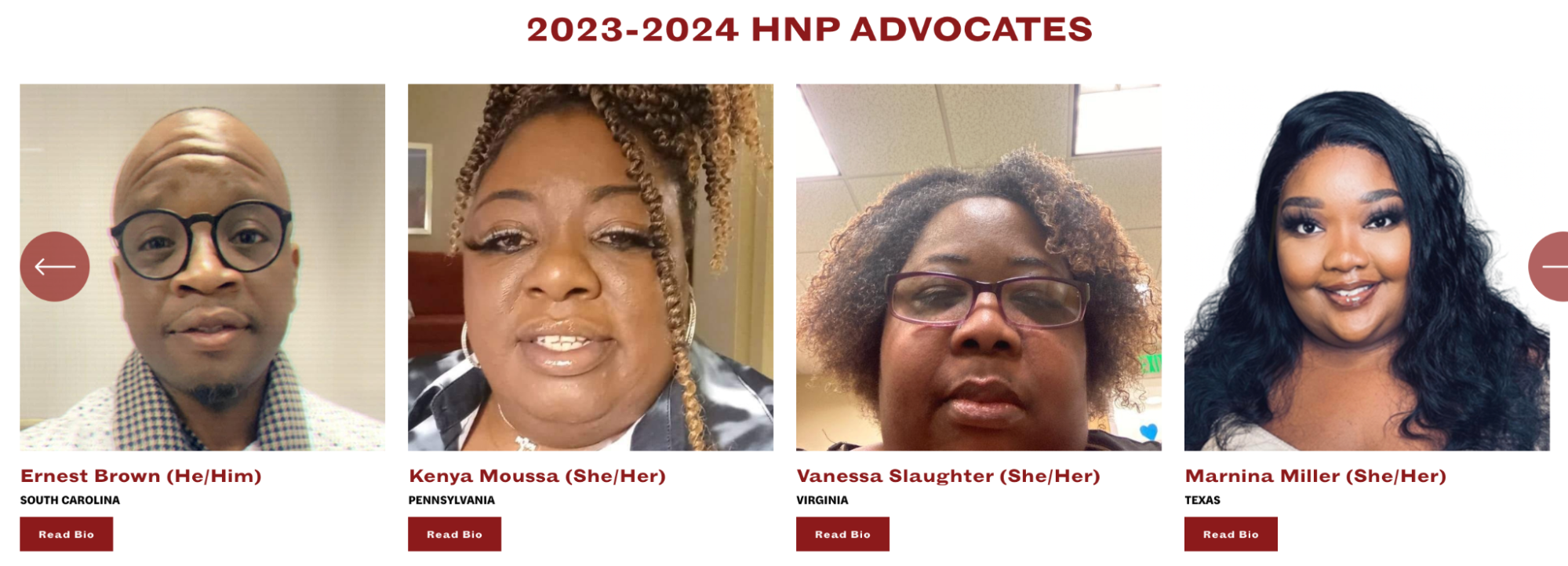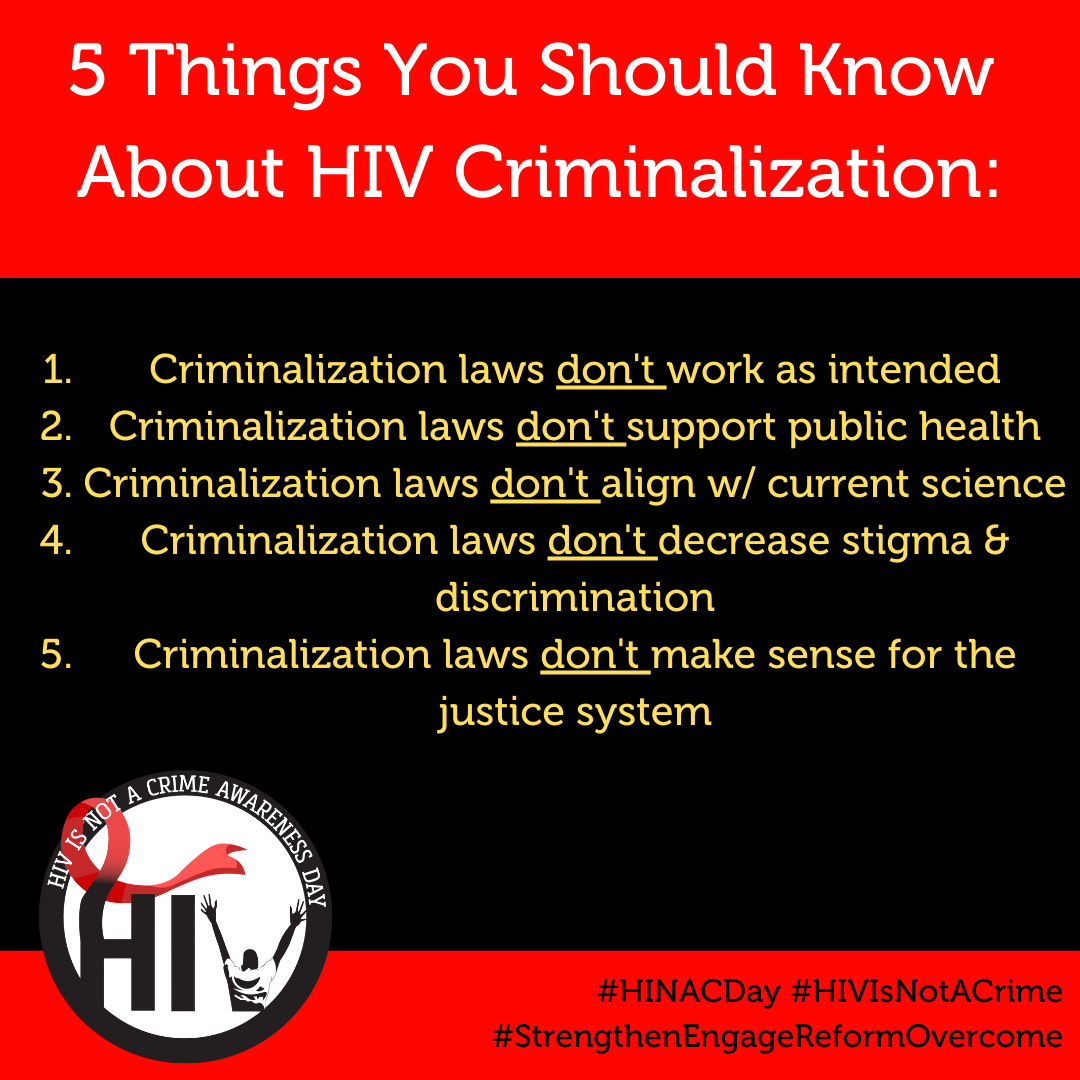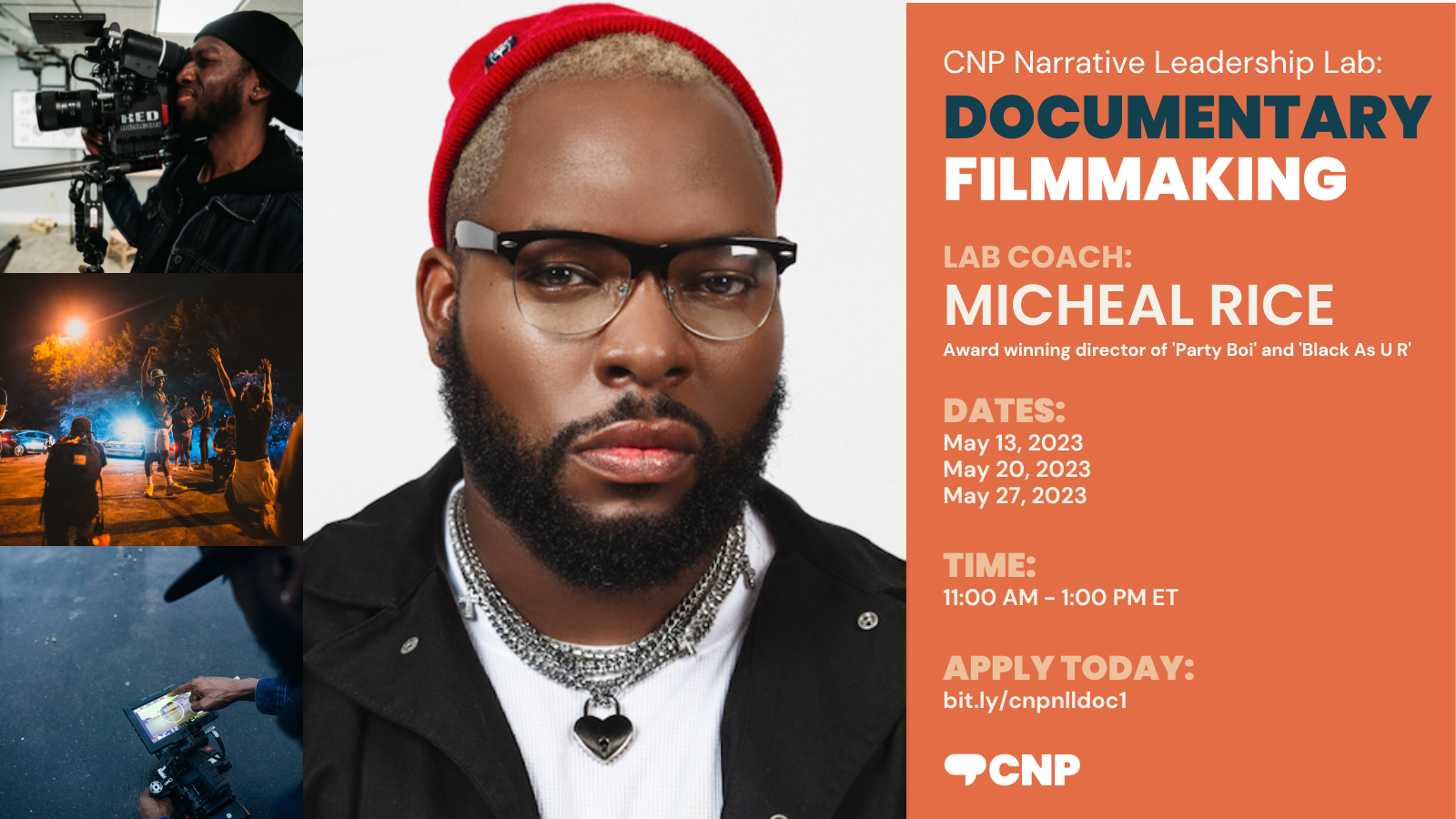|
(Was this message forwarded to you? Sign up to receive quarterly updates from the HNP Collective!) The Health Not Prisons Collective is an intersectional national initiative launched in 2020 by Counter Narrative Project (CNP), Positive Women’s Network – USA (PWN), Sero Project, Transgender Law Center (TLC), and the U.S. Caucus of People Living with HIV (the HIV Caucus) — longtime collaborators led by, and accountable to, communities most affected by HIV criminalization in the United States. The Health Not Prisons Dispatch is a quarterly bulletin highlighting recent developments relevant to criminalization and policing of people living with HIV in the United States, along with upcoming events, relevant resources, and opportunities to get involved. HNP prioritizes authentic engagement, activation, training, and leadership rooted in our principles and deep investment in our communities. To that end, we want to hear from you! For more information about the coalition, ways to get involved, or efforts you would like to see the Collective support, email Elena Ferguson at [email protected]. |
|
Greetings readers, As many of you may already know, we lost one of our HNP Advocates, Rymsky Evans earlier this month. The entire HNP Collective is devastated and heartbroken by the sudden passing of Rymsky, a loving mother and fierce advocate for Black women living with HIV in the South. She was a passionate organizer and had so many freedom dreams for her community of women living with HIV in Mississippi. She never failed to lead with love and brought great energy and incredible vision to all of the movement spaces that she occupied. Her willingness to grow and learn in service of her community will be missed. She will be missed. This edition of the Health Not Prisons Dispatch will be dedicated in her honor. We love you, Rymsky. Rest in Power. -Elena Ferguson |
|
Collective Updates |
In-Person Strategy Session |
HNP started off spring of 2023 with a bang by gathering in Houston, Texas for an in-person strategy session! This was the first time that the Collective has met in-person since our founding in 2020. Over two and a half days, the HNP partners gathered to discuss our upcoming major projects as a Collective; to more deeply ground ourselves in the framework and practice of abolition with the help our amazing facilitator, Josie Pickens of UpEnd Movement; and to learn from local Texas advocates from the Transgender Education Network, the Afiya Center, the PWN Texas Strike Force, and the Equality Federation about the political reality of working to end the criminalization of people living with HIV and LGBTQI+ folks in Texas. Ultimately, it was a great opportunity to build community with one another and experience the lovely city of Houston together! |
|
Meet the 2023-2024 HNP Advocates Cohort |
On May 10th, The HNP Collective announced the 2023-2024 cohort of the HNP Advocates Project! We have welcomed back our three returning advocates: Lashanda Salinas (she/her, Tennessee), Kem Moore (they/him, Indiana), and Baile Martin (she/her, Louisiana). After reaching out to local HIV decriminalization/modernization coalitions and interviewing a talented and passionate group of applicants, the Collective has officially selected 4 new advocates: Kenya Moussa (she/her, Pennsylvania), Ernest Brown (he/him, South Carolina), Marnina Miller (she/her, Texas), and Vanessa Slaughter (she/her, Virginia), to join our 2023-2024 cohort. To read more about our advocates, check out their profiles on our new HNP website. |
|
Over the next year, our HNP advocates will participate in a structured curriculum with regular learning opportunities and will engage in their local coalitions to end the criminalization of HIV and other forms of criminalization that impact people living with HIV. Stay tuned to HNP’s social media pages in the coming months as many of the trainings offered to the advocates will also be open to the public. Congratulations to our new cohort of advocates and we look forward to connecting with many of them in-person during the upcoming HIV is Not a Crime (HINAC) 5 Training Academy. |
Social Media Alert! |
The Health Not Prisons Collective is officially on Twitter, Facebook, and Instagram! We also have a new website! Be sure to give us a like and a follow and stay up to date on all of our updates and educational opportunities. |
HNP at AIDS Watch |
This year, the Caucus once again served as a lead sponsor for AIDS Watch, the largest, nationwide annual HIV advocacy event in the country, as well as a collaborator on the development of the 2023 AIDS Watch Policy Briefs. The Caucus hosted its annual reception , where two (2) people living with HIV were honored. The Caucus also led the older adults living with HIV listening session. In more exciting social media news, the Caucus is now on Instagram. Be sure to give them a like and a follow! HNP Partners, PWN and Sero, also had a strong presence at AIDS Watch with staff members facilitating a number of discussions and community conversations including: Melanated Movement, Reproductive Justice, MHS, Women in HIV Policy, and HIV in the South. In addition, at least 50 PWN members attended AIDS Watch, including several PWN staff and members leading their state delegations (many of them for the first time!) to speak with federal lawmakers. |
Partnership Updates |
This spring, PWN continued to fight against a controversial, broad and non-consensual data collection, sharing, and surveillance practice known as molecular HIV surveillance (MHS) and cluster detection and response (CDR). HIV advocacy organizations, networks of people living with HIV (including PWN), and human rights activists have raised the alarm about MHS for years because of lack of informed consent, data privacy concerns, and potential risks of criminalization, including HIV criminalization. |
|
|
PWN staff and members stayed busy this spring by visiting lawmakers for state HIV advocacy days. PWN staff and members attended state HIV Advocacy Days across the country in Colorado, Texas, and Alabama. Attendees spoke with their state lawmakers about issues that matter most to people living with HIV, such as ending HIV criminalization and supporting reproductive freedom. It’s no secret that the criminalization of HIV and abortion are intrinsically connected. In April 2023, a Texas judge’s decision could have blocked (but didn’t!) access to a safe, effective, and commonly used abortion medication, Mifepristone. PWN released a scathing statement, featured in POZ Magazine, condemning the court decision and calling for an end to the criminalization of abortion. PWN members also decried the decision; LaDawn Tate and Brooke Davidoff worked with PWN staff (Amanda Le, Antoinette Jones and Sallie Thomas) to host a Facebook Live discussion of some of the implications of the decision around Mifepristone for people living with HIV. If you would like to stay involved in PWN’s fight for reproductive freedom, take their pledge today! |
On February 28th, the Sero Project honored the second annual National HIV Is Not A Crime Awareness Day (HINAC Day), a day to bring awareness to the harms of criminalizing people based on their HIV-positive status. There were events across the U.S. to commemorate the day, including: |
|
Over the past few months, the entire Sero team has been busy making their final preparations for the HIV Is Not A Crime V National Training Academy in Emory, VA. On April 10th, the Sero Project completed its Road to HINAC5 webinar series with its final webinar, “Road to HINAC5 — What to Expect.” You can find the entire Road to HINAC 5 webinar series, on the HINAC YouTube channel. Deirdre “Speaks” Johnson, Sero Micro-Grant Program Assistant, and Kamaria Laffrey, Sero Co-Managing Director, raise important questions about “status neutral” approaches to HIV prevention and care in their article “Fix the Law First” in the Spring 2023 issue of HIV Specialist magazine. They question whether there is a transparent, inclusive, and MIPA-driven strategy for an evidence-based rollout of the “status neutral” approach, especially in the context of HIV criminalization, limited HIV funds and services, and the continued marginalization and stigmatization of communities most impacted by HIV. Like Sero, the Transgender Law Center is busy preparing for the HINAC 5 Training Academy in June. Positively Trans will be helping to support the Trans Institute, several plenaries and workshops, and multiple Positively Trans members, who received scholarships to HINAC V. |
The Counter Narrative Project is planning their Spring 2023 Media Roundtable in May. The CNP Media Roundtable brings journalists, artists, storytellers, and advocates together to strategize approaches to storytelling, HIV justice, and cultural change. |
|
CNP is also hosting a workshop on documentary filmmaking with Micheal Rice. Sessions will be on May 13th, May 20th and May 27th from 11am-1pm EST. Applications have closed for this workshop. In addition, CNP is planning their 2023 CNP Summit, the theme is “Collective Remembrance as a Revolutionary Act.” Finally, CNP Executive Director, Charles Stephens, was recently appointed to the Morehouse School of Medicine HIV Equity Task Force. Congrats Charles! The US PLHIV Caucus and ROC4Aging+ are preparing a historic series of events to commemorate the 40th Anniversary of The Denver Principles and showcase how the HIV community has evolved over these past 40 years of this epidemic from patient rights to human rights. Events include a national film festival (June 9-11), a virtual celebration and educational experience (June 12) and an in-person Congressional Briefing in Washington D.C. (June 14). Stay tuned! We will have more updates in the next HNP Newsletter. Caucus Member, Robert Suttle, has also been busy speaking on several panels on a variety of different topics. On March 22nd, Robert spoke on a panel to launch the Shelby County Mayor’s HIV Equity Coalition (HIVE Coalition). The coalition comes in light of the State of Tennessee’s refusal of federal funds for HIV care and prevention. The HIVE Coalition will engage area stakeholders to discuss the current problems facing people with HIV and ways for the community and local officials to help support organizations following the state’s destructive decision. Robert also participated in a HINAC Day webinar on legal, health, and equity considerations related to HIV criminalization. |
National Updates |
Over the past few months, there have been a number of high-profile federal court decisions that will have dangerous implications for people living with HIV. In Braidwood v. Becerra, a federal court judge, Judge O’Connor, struck down the Affordable Care Act’s (ACA) preventive services requirement, which mandates that health plans cover services like PrEP, screenings for HIV and STIs, cancer screenings, and breast and chest feeding services and support without any out-of-pocket costs to the patient. Another notable case is Alliance for Hippocratic Medicine v. FDA (a.k.a. the Mifepristone case), in which a Trump-appointed judge struck down the Federal Drug Administration’s (FDA) approval of mifepristone—one of two medications in a regimen for medication abortion. While both of these cases could have disastrous consequences, neither ruling is in effect, which means that Mifepristone is still available for medication abortion where and when abortion is legal and PreP is still free under almost all health insurance plans. To learn more about the Braidwood case, the Mifepristone case, and other looming Supreme Court cases, read PWN’s #HIVResists Monthly Policy Updates for February 2023 and March 2023. Additionally, there was a thrilling, hard won victory for birthing and parenting people living with HIV this spring: the US Department of Health and Human Services (HHS) issued new breast and chest feeding guidelines for people living with HIV. The 2023 updates to the “Recommendations for the Use of Antiretroviral Drugs During Pregnancy and Interventions to Reduce Perinatal HIV Transmission in the United States” (a.k.a. Perinatal HIV Clinical Guidelines) give healthcare providers the information they need to engage with women and other birthing parents living with HIV about decisions related to pregnancy and infant feeding. Congratulations to the Caucus and so many other HIV advocates for this historic achievement! You can learn more about the Guidelines by checking out this short interview by Caucus Vice-Chair, Martha Cameron here. |
Decriminalization Efforts at the State Level |
HIV Decriminalization |
Troubles in Tennessee: A Timeline
2023 Legislative Session Recap*Disclaimer: HNP staff tries to monitor all relevant legislation related to HIV and sex work decriminalization, but unfortunately we can’t keep track of every important piece of policy. Did we miss a decriminalization bill that you worked on? If so, please email the editor of the HNP Dispatch, Elena Ferguson at [email protected] As legislative sessions across the country come to a close, let’s take a look back at the efforts to pass HIV modernization or total repeal bills passed:
|
Sex Work Decriminalization |
Unfortunately, the sex work decriminalization bills introduced this year did not fare as well as SB 0807 in Tennessee. Here’s a look at the slate of sex work decriminalization bills that will not make it to the governor’s desk this year: Assembly Bill 1112 in NY (addresses criminalization of massage workers); SB 4396 in NY (decriminalizes sex work more broadly); SB 1204 in Hawaii; HB 6064 in Rhode Island; HB 372 in Vermont; HB 1603 in Massachusetts; HB 1383/SB 0182 in Tennessee. |
Global News |
In late March, the Ugandan Parliament passed the Anti-Homosexuality Act, a bill that would result in life imprisonment for any homosexual act and undermine Uganda’s HIV response. This would only further criminalize PLHIV in Uganda. You can read more in Devex here. In March, news broke of the abhorrent conditions in which Russians living with HIV who are incarcerated must live in. Russians who are incarcerated who are living with HIV often do not have access to life-saving medication and that has led to some dangerous consequences. To learn more, you can read Amy Fallon’s piece in Meduza. In an extreme violation of reproductive justice, Black women living with HIV in South Africa continue to be forcefully sterilized, rather than being offered birth control options. To read more, you can check out this piece in The South African Magazine. |
Resources from the Field |
Watch/Listen |
|
Read |
|






.png)



